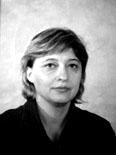Gouchtchina, Vera | Russia

Vera Gouchtchina was born in Voronezh, the city in the middle of European part of Russia. In 1981 she got her MA in History in the Voronezh State University. After this she worked as an assistant at the Dept. of Philosophy in VSU. In 1984-87 she had her post-graduate studies in Philosophy in the Moscow State University. Her dissertation for PhD was devoted to the problems of historical epistemology - to the subject matter specifics of history as a science. In 1988 she got PhD in Philosophy in MSU and in 1988-1994 worked as an Associate Professor at the Dept. of Philosophy in VSU.
In 1995 she began to teach as an Associate Professor at the Department of Cultural Studies in the Voronezh State University and does it till present. She conducts classes on the History of the World Culture, Theory and Philosophy of Culture, Russian Culture, Ethics, Aesthetics, Business Ethics, American Studies. Now she prepares a course on gender problems in Russia.
In the 1996/97 academic year she had research training in the George Washington University, Washington, D.C., as a part of the Junior Faculty Development Program administered by the Council for the International Exchange of Scholars and funded by the US Department of State's Junior Faculty Development Program (JFDP). Here she concentrated on studying courses on Cross-Cultural Management, Business Ethics, American Studies.
She also participated in some international Summer Schools and Academies (in 1995 - on American Studies in the USA, in 1998 - on Ethics of Capitalism in the CEU, Hungary, in 2000 - on Work, Technology and Culture in Graz, Austria). In 1997-99 she had a grant from the OSI in Budapest for doing research on the project devoted to studying business ethics in Russia in comparative perspective. In summer 2001 she worked for a month in the Open Society Archives in the Central European University in Budapest on the theme "GULAG and its role in the marginalization of work-gender relations in Russia".
In 1999-2001 she held the position of the senior researcher at the Department of Cultural Studies in VSU for work on her habilitation "Axiology of Work in Russian Philosophy and Culture". Her research stay in Graz's Institute for Advanced Studies on Science, Technology and Society presupposes continuation of her research on the habilitation theme. From October 2001 to June 2002 she was a Fellow at the Institute for Advanced Studies on Science, Technology and Society.
Project at IAS-STS: Gender-work relations and axiology of work in cross-cultural perspective: a contextual approach.
Many positive and negative features and sides of the current technological evolution are not only the results of their immanent internal development but also the consequences of the cultural and social context impact, where this interaction of technology and context takes place. It is of utmost importance that social and cultural environment represents an aggregate of the factors and traditions, which could be rooted in the very remote past but still orient the development of technique and technology in the long-term perspective. Therefore, the discourse of different cultural texts is necessary for understanding, explaining and forecasting peculiarities, facts, and trends in modern technical and technological developments.
Sociocultural context is important for how all elements and processes of the system of work function. Design, manufacturing and use of products take place in a certain social and cultural environment. Growing importance of the sociocultural dimensions of modern products demands corresponding sociocultural qualities not only of their producers and industrial milieu but also of their users and environment, where they are being consumed.
Identifying mental and behavioral patterns explicitly and/or implicitly expressed in different cultural texts (material and symbolic, visual and corporal, folklore and artistic, religious and philosophic) is one of the possible ways to reveal cultural roots of contemporary technical consciousness and technical culture in general. Studying different cultural texts could help to trace the real evolution of the system of work and its representations in culture, the history of the culture and technology interaction. Identification of the system of work won't be full without its gender aspect. As a matter of fact, among numerous social and cultural factors, gender and work relations, attitudes and values represent the main focus of the project.
Gender discourse of cultural texts in their relations to different elements of work and their everyday manifestations (e.g., work ethics, appearance, gestures, etc.) will promote description of gender display and make clear its feedback on operational and technological patterns of human actions. Studying sociocultural context, where interaction between actors and nature by means of technology takes place, would help to define the constants of the Russian culture in the field of work-gender relations and to identify the Russian cultural constitution. This is one the most important and urgent problem of Russian humanities and social sciences nowadays. It presuppose preliminary revision of the traditional Russian cultural heritage from the point of view of the new socioeconomic realities emerged in Russia and in the global community. Rethinking of traditional patterns have to disavow cultural artifacts, phenomena and pseudoscientific assertions, which are either out-of-date or don't fit the reality and practice, to reveal their causes and consequences.
It also could help to show positive tendencies in Russian culture and make recommendations how to strengthen them and implement into practice, how to reach synergy between economic, technological and cultural politics. That's why this research project draws on the study of different kinds of Russian narratives: philosophic treatises and sociologic surveys, folk texts and literature. Scientific literature on the topic is also reviewed. Comparative perspective is included as well.
As it was mentioned above, this project is a prolongation of the main research topic "Axiology of work in Russian Philosophy and Culture".
